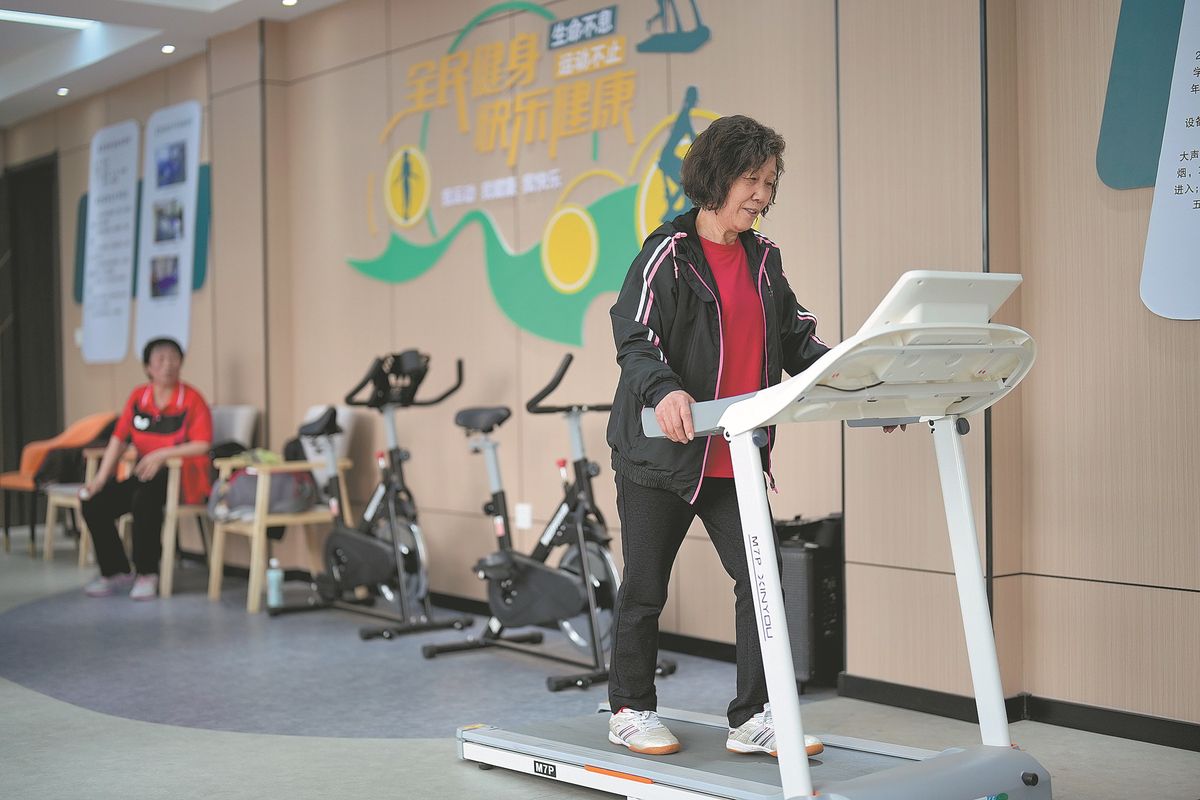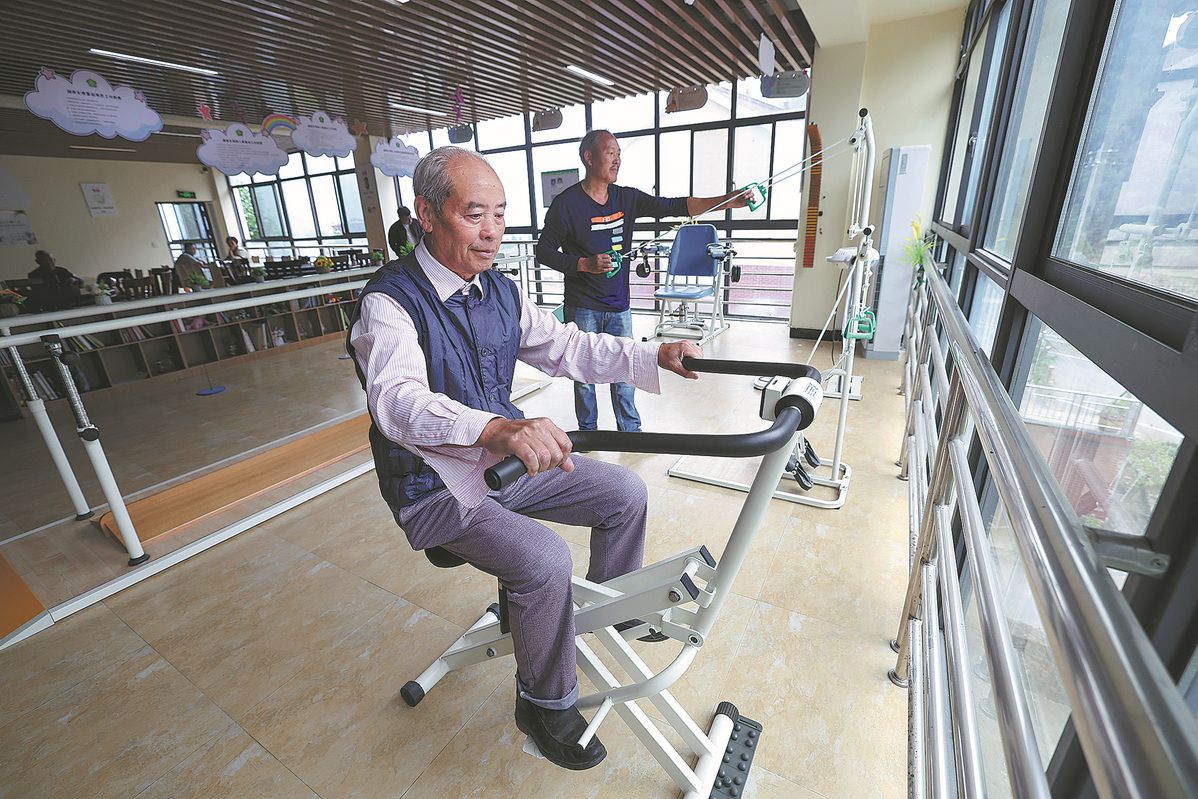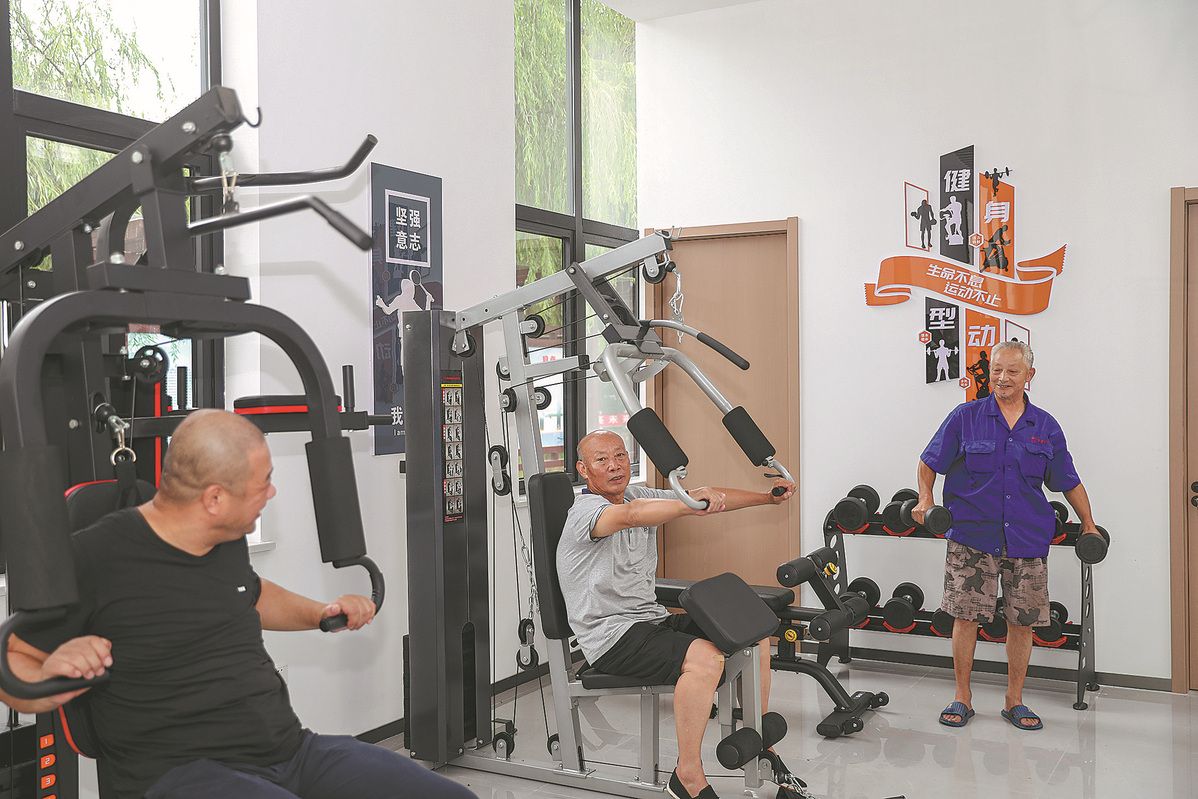Elderly perk up exercise regimen to stay fit
Source:CHINA SPORTING GOODS FEDERATIONRelease time:2024-05-07Clicks:
Article From:chinadaily

Senior citizens exercise at an elderly care service center in Tangshan, Hebei province in April 2023. In recent years, Hebei has been accelerating the construction and optimization of such service centers. MOU YU/XINHUA
It seems sporting activities these days are not only for Gen Z or the middle-aged, but also for health-conscious elderly residents.
Of late, an increasing number of elderly Chinese are making their way to gyms and training centers to improve their physical and mental health.
Wang Kexin, a 57-year-old former business owner, has once again regained his passion for fitness training and lifting weights.
Wang, whose childhood dream was to become a track-and-field athlete, now trains four times a week, with each session lasting one-and-a-half to two hours.
In two years, his body weight has fallen from over 100 kilograms to 80 kg. "I feel strong mentally and look better compared to friends of the same age," Wang said.
On weekends, he meets up with former schoolmates to play football. "Sportsmanship is not only the privilege of the young," Wang said.
"I have had so much joy from keeping the habit of fitness and a healthy diet; being disciplined physically and mentally provides clarity at my age."
Wang's physical trainer, Sarah Shao of Ujoy Fitness Studio in Beijing, said in recent years, she has seen a rising number of older participants joining gyms and starting to work out with the same frequency and training levels as younger members.
"After retirement, elders have more leisure time to mark steady attendance at the courses," Shao said. "Fitness workouts help them improve health and prevent muscles from diminishing during aging."
She said: "I have a member who is 68 years old. Her daughter encouraged her to visit the gym, have a more active social life and grow stronger as she ages."

Villagers exercise at a gym in Nanxun district, Huzhou, Zhejiang province in July 2023. Huzhou has been building a fitness service system that covers rural and urban areas. LU ZHIPENG/FOR CHINA DAILY
Silver economy
China's silver economy has been boosted by the rising number of elderly in the country.
According to data from the National Bureau of Statistics, by the end of 2023, China's population aged 60 and above accounted for 21.1 percent of the total population, with those aged 65 and above making up 15.4 percent, indicating that the nation has entered a stage of a moderately aging society. The large senior population translates to ample potential consumption market for the elders.
This trend is more evident in first- and second-tier cities, where a greater number of middle-aged and elderly people are embracing new retirement lifestyles, which include taking up such pastimes as playing musical instruments, traveling, exercising and attending senior universities.
The stereotype of elderly people living frugal and sedentary lives has gradually evolved into them learning to work for a healthy life expectancy. However, in the area of senior fitness, a supply-demand mismatch still exists.
While creating corresponding products and courses to attract the elderly to the gym, the first step should be to set up exercise plans that can match the basic needs of seniors, said trainer Shao.
Besides emphasizing exercise, gyms marketing for seniors should also focus on promoting healthy lifestyle habits such as a balanced diet.
Regularly organizing member gatherings and guiding and communicating with the elderly by sports instructors can alleviate the psychological barriers of the elderly, said Shao.
Over the past few years, some gyms exclusively for the elderly have sprung up in Shanghai. Fitness operators such as Shangti Health Technology are exploring solutions for gyms that serve seniors in China.
The elder sports center in Shanghai operated by Shangti Health Technology offers workout facilities that allow the elderly to train passively through vertical vibrations that imitate rope jumping to stimulate and boost their physical cycles. These facilities help to significantly improve insomnia and digestion issues among senior citizens.
The company provides professional trainers to teach how to use workout facilities designed for the elderly.
Hou Suxi of Shangti said the facilities are designed to protect the knees and other vulnerable body parts of the elderly during exercises.

Elderly Chinese use fitness equipment to exercise at a home care service center in Fuyang district, Hangzhou, Zhejiang province in October 2023. Fuyang has been building gyms and other facilities within a walking distance of 15 minutes from their homes. XU YU/XINHUA
However, a considerable number of seniors in China still lack awareness about actively participating in fitness regimens and exercise routines.
The centers now have members aged over 65. The member system tracks age, body condition, workout duration and content while providing suggestions and support in training, according to the company.
Physical fitness is an important component in the healthy lifestyles of elderly people.
The National Fitness Plan (2021-25) proposes that by 2025, the proportion of residents in China who regularly participate in physical exercise will reach 38.5 percent.
The Healthy China Action (2019-30) also states that by 2030, the proportion of urban and rural residents who regularly participate in physical exercise will exceed 40 percent.
Survey results indicate that nearly half of seniors participate in physical exercise at least once a week, and overall, two-thirds of them regularly engage in fitness activities.
As the main force in the fitness community, the proportion of middle-aged and elderly people who regularly participate in physical exercise will increase even more in the future, according to the survey.
In addition to deepening the level of participation in physical exercise, the categories of fitness participation among elderly people will also become more diversified.
This poses a challenge to companies on how to inspire middle-aged and elderly people through concepts and organizations, and to drive more gray-haired residents to enter the gym.
wangzhuoqiong@chinadaily.com.cn
Copyright ©2013-2024 CHINA SPORTING GOODS FEDERATION, All Rights Reserved ( 京ICP备05083596号-1 )




